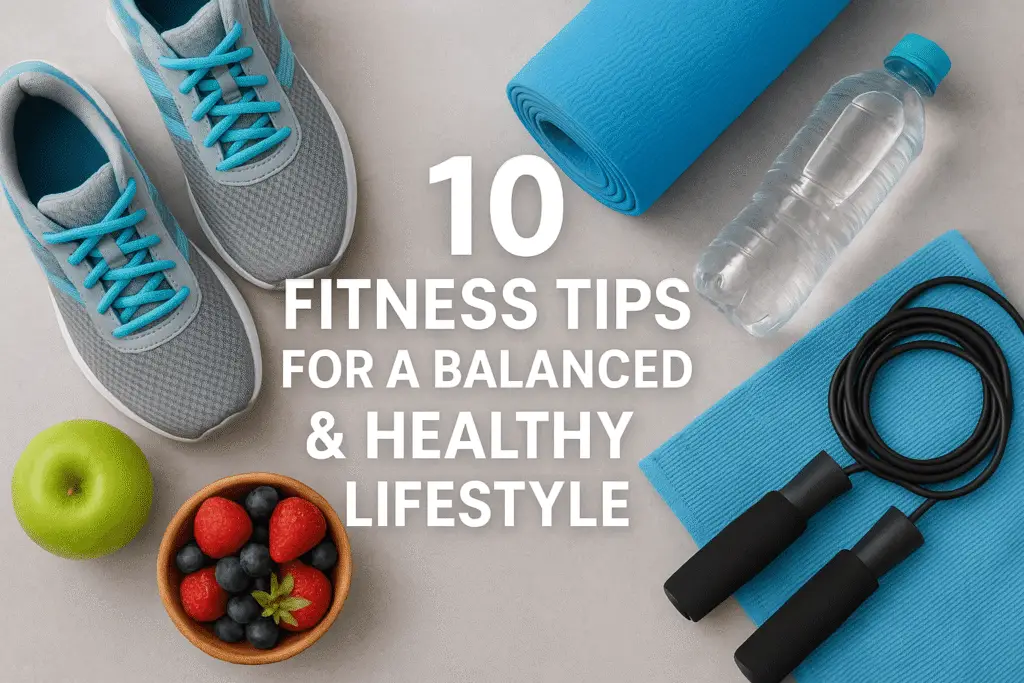Living a healthy lifestyle has become more important than ever in today’s fast-paced world. With long working hours, endless responsibilities, and the constant distraction of digital devices, it’s easy to ignore our physical and mental health. But the truth is simple: our body and mind need consistent care. Achieving balance is not about perfection; it’s about creating sustainable habits that keep you energized, strong, and happy.
This comprehensive guide covers 10 powerful fitness tips to help you maintain a balanced and healthy lifestyle—from nutrition and exercise to rest, mental health, and discipline. Whether you’re just starting or looking to improve your existing routine, these tips can help transform your daily life.
Why Fitness is Essential for a Healthy Lifestyle
Fitness isn’t only about hitting the gym or lifting weights. It’s about the overall wellness of your body and mind. Exercise helps reduce the risk of chronic diseases, strengthens your immune system, improves sleep, boosts mood, and increases productivity. When paired with healthy eating and proper rest, fitness creates a solid foundation for long-term health.
By adopting the following 10 fitness tips, you’ll not only improve your physical strength but also create harmony between your mind and body—ensuring a balanced, healthy lifestyle.
1. Start with Realistic Fitness Goals
The first step toward a healthy lifestyle is setting achievable goals. Many people begin their fitness journey with high motivation but lose interest when results don’t appear quickly. Instead of chasing perfection, focus on progress over perfection.
How to Set Realistic Goals:
- Define clear, measurable objectives (e.g., “walk 30 minutes daily” instead of “get fit”).
- Break big goals into smaller milestones.
- Track your progress weekly to stay motivated.
- Be flexible—life can get busy, but consistency matters more than perfection.
Pro Tip: Instead of aiming for rapid weight loss or extreme diets, target sustainable changes that fit into your lifestyle.
2. Incorporate Regular Exercise into Your Routine
Exercise is one of the pillars of a healthy lifestyle. It not only builds strength but also keeps your heart, lungs, and mind in top condition. A well-rounded workout routine includes cardio, strength training, and flexibility exercises.
Types of Exercises to Try:
- Cardio (aerobic exercises): Running, cycling, swimming, brisk walking.
- Strength training: Weightlifting, resistance bands, bodyweight exercises (push-ups, squats).
- Flexibility & mobility: Yoga, stretching, Pilates.
- Mind-body activities: Tai chi, meditation with movement.
Aim for at least 150 minutes of moderate exercise per week or 75 minutes of vigorous exercise. Spread your workouts across the week for consistency.
Quick Tip: If you’re short on time, try High-Intensity Interval Training (HIIT). Just 20 minutes can give you a full-body workout and boost your metabolism.
3. Prioritize a Balanced Diet
You can’t out-exercise a poor diet. Nutrition plays a central role in achieving a healthy lifestyle. A balanced diet fuels your body, supports muscle recovery, and keeps your energy stable throughout the day.
Key Components of a Balanced Diet:
- Fruits and vegetables: Provide vitamins, minerals, and antioxidants.
- Lean proteins: Chicken, fish, tofu, legumes, eggs for muscle repair.
- Whole grains: Brown rice, oats, quinoa for sustained energy.
- Healthy fats: Avocado, nuts, seeds, olive oil for brain and heart health.
- Hydration: Water should be your go-to drink. Limit sugary beverages.
Pro Tip: Practice mindful eating. Avoid distractions while eating and listen to your body’s hunger signals. This prevents overeating and helps digestion.
4. Get Enough Sleep and Rest
Sleep is often overlooked, but it’s a non-negotiable part of a healthy lifestyle. During sleep, your body repairs tissues, balances hormones, and consolidates memory. Without adequate rest, your workouts and diet won’t deliver maximum benefits.
Tips for Better Sleep:
- Aim for 7–9 hours of quality sleep every night.
- Maintain a consistent sleep schedule (even on weekends).
- Limit screen time before bed—blue light affects melatonin levels.
- Create a calm sleep environment (dark, cool, and quiet).
Remember: Rest days are as important as workout days. They allow your muscles to recover and prevent injury.
5. Stay Consistent and Build Discipline
Motivation comes and goes, but discipline creates long-term results. Consistency is the backbone of a healthy lifestyle. Instead of relying on fleeting energy, build habits that become automatic over time.
How to Build Consistency:
- Schedule workouts like appointments.
- Start small—habit stacking makes changes sustainable.
- Find an accountability partner or join a fitness group.
- Reward yourself for progress (but not with junk food).
Pro Tip: Focus on building a routine that feels enjoyable, not like a punishment. That way, fitness becomes part of your life instead of a temporary phase.
6. Manage Stress Effectively
Stress can damage your health and throw you off balance. Chronic stress increases cortisol levels, leading to weight gain, fatigue, and poor immunity. Managing stress is key to maintaining a healthy lifestyle.
Stress Management Techniques:
- Practice mindfulness meditation or deep breathing.
- Engage in relaxing hobbies like reading, painting, or gardening.
- Exercise regularly—physical activity reduces stress hormones.
- Spend time in nature to recharge mentally.
- Limit exposure to negative media or environments.
Quick Tip: Even 10 minutes of daily meditation can drastically reduce stress and improve focus.
7. Stay Hydrated Throughout the Day
Water is life. Proper hydration is essential for digestion, nutrient absorption, and muscle performance. Dehydration leads to fatigue, headaches, and poor workout results.
Hydration Tips:
- Drink at least 8–10 glasses of water daily (more if you exercise heavily).
- Start your morning with a glass of water.
- Carry a reusable water bottle everywhere.
- Include hydrating foods like cucumber, watermelon, and oranges.
Pro Tip: Avoid excessive caffeine and alcohol, as they dehydrate your body.
8. Balance Work, Fitness, and Leisure
A healthy lifestyle means more than just diet and exercise. It’s about balance—between work, fitness, relationships, and leisure. Burnout can harm both physical and mental health.
How to Create Balance:
- Set boundaries between work and personal life.
- Schedule downtime for relaxation and hobbies.
- Engage in social activities—connections improve emotional health.
- Avoid overtraining; too much exercise can be harmful.
Remember: Balance is the secret ingredient to sustainability. You can’t pour from an empty cup, so prioritize self-care alongside responsibilities.
9. Avoid Harmful Habits
Unhealthy habits can undo all your hard work. Smoking, excessive drinking, junk food, and prolonged screen time harm your fitness goals and overall well-being.
Steps to Break Bad Habits:
- Replace soda with sparkling water or herbal tea.
- Swap fried snacks with nuts, fruits, or roasted seeds.
- Limit alcohol to occasional, moderate consumption.
- Take regular screen breaks to protect your eyes and posture.
Pro Tip: Don’t try to eliminate all bad habits at once. Replace them gradually with healthier alternatives.
10. Keep Learning and Stay Motivated
The journey to a healthy lifestyle never ends—it evolves. Staying motivated requires constant learning, adaptation, and inspiration.
Ways to Stay Inspired:
- Follow fitness blogs, podcasts, or YouTube channels.
- Track your progress with fitness apps or journals.
- Set new challenges (5k run, yoga challenge, strength goals).
- Celebrate milestones, no matter how small.
Remember: Fitness is a lifelong commitment. Keep exploring new activities to keep things exciting and motivating.
Frequently Asked Questions (FAQs)
1. What is the first step toward a healthy lifestyle?
Start with small, realistic goals like walking daily, drinking more water, or adding vegetables to meals.
2. How many hours of exercise do I need weekly?
Experts recommend at least 150 minutes of moderate exercise or 75 minutes of vigorous activity per week.
3. Can I live a healthy lifestyle without going to the gym?
Absolutely! Bodyweight exercises, walking, yoga, cycling, and home workouts are all effective.
4. How important is mental health in a healthy lifestyle?
Very important. Mental health affects your motivation, discipline, and overall quality of life. Stress management, mindfulness, and social connections are essential.
5. Do I need supplements for a healthy lifestyle?
Supplements may help if you have deficiencies, but a balanced diet should be the priority. Consult a doctor before adding supplements.
Final Thoughts
Building a healthy lifestyle is not about perfection—it’s about balance, discipline, and sustainable choices. By applying these 10 fitness tips, you can create harmony between your body and mind, leading to long-term health and happiness.
Start small, stay consistent, and keep evolving. Over time, your daily habits will shape not just your body, but your entire life. Remember, the journey to wellness is lifelong, and every small step counts toward a stronger, healthier, and more balanced you.



Great
Nice idea